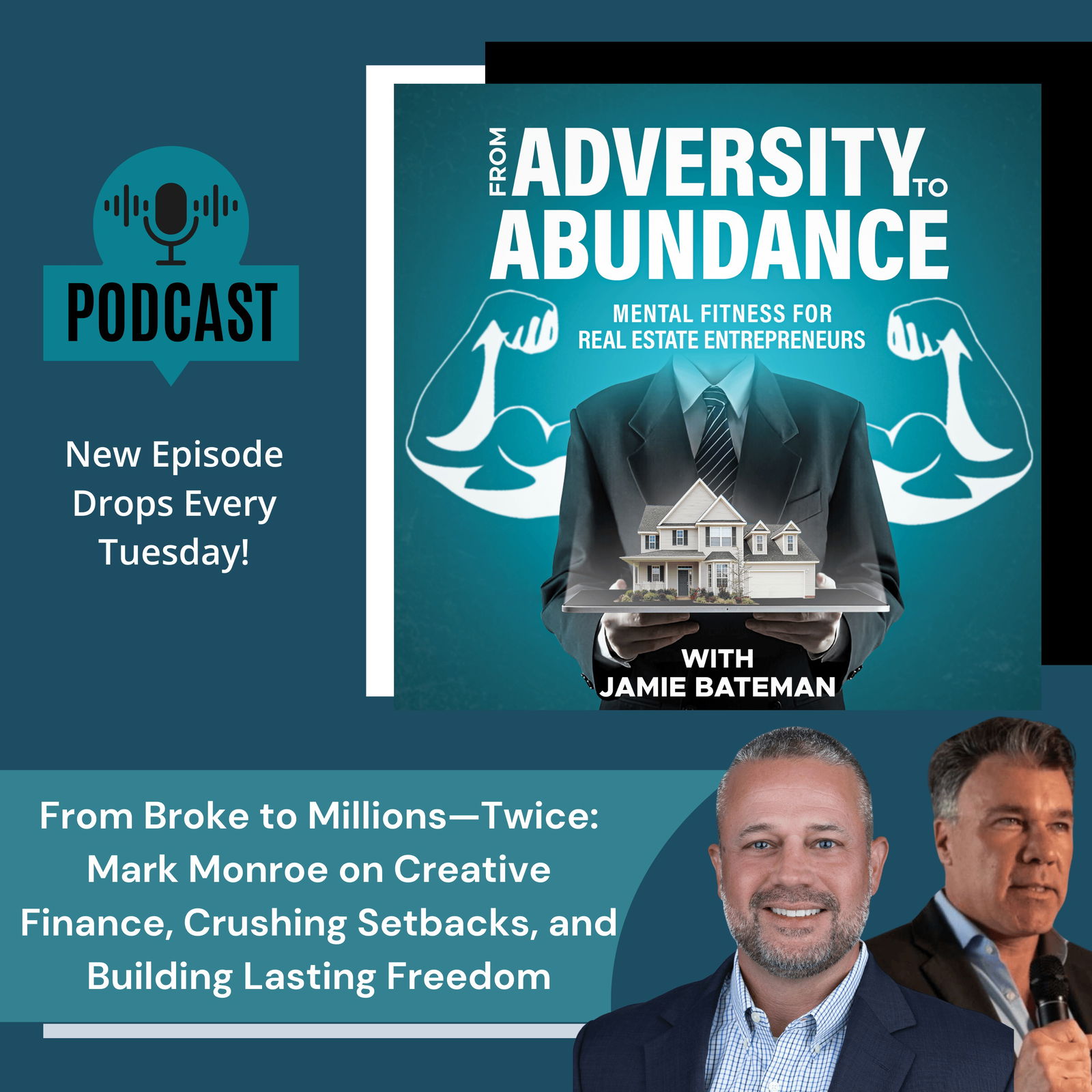In this episode of From Adversity to Abundance, host Jamie Bateman welcomes Mark Monroe, a seasoned real estate investor and creative financing expert with a story that’s anything but linear. Born into poverty in Vermont, Mark climbed the ranks of the mortgage industry, eventually leading a team of over 100 loan officers. But after a major investment in an online lending program went south, he lost nearly everything—about 90% of the wealth he had built.
This episode dives deep into Mark’s rollercoaster journey: from growing up with nothing to building a financial empire, losing it all, and then rebuilding his life on his own terms. Today, Mark enjoys the freedom to travel the world, indulge in good food, and work on his own schedule—an outcome made possible by the skills he developed in both high-pressure finance roles and, surprisingly, during his early days at McDonald’s.
Mark opens up about his mindset shifts, his approach to solving problems through empathy and active listening, and how those traits translated into massive success in creative finance. He also shares the emotional toll of a serious health scare, revealing the mental resilience that got him through both financial ruin and physical adversity.
This episode blends personal grit, business insights, and powerful lessons in a way that’s both raw and uplifting. Whether you're navigating hardship or simply looking for smarter ways to invest, Mark’s story will inspire and inform.
Guest Introduction: Mark Monroe
Mark Monroe is a real estate investor, creative financing expert, and former mortgage industry leader. He built a large-scale operation with over 100 loan officers, lost most of his fortune in a failed lending program, and has since rebuilt his financial life through savvy investing and strategic thinking. Known for his empathetic approach and creative deal-making, Mark now enjoys a lifestyle of freedom and purpose.
Episode Highlights:
- From Poverty to Wealth—Then Rock Bottom, Then Higher Than Ever – Mark’s full-circle journey through poverty, peak success, major financial loss, and an even stronger rebound.
- Leading in the Mortgage Industry – Building and managing a team of 100+ loan officers.
- Losing It All – The online lending program that led to a 90% loss of his wealth.
- Skills Learned at McDonald's – How early job experiences shaped his business mindset.
- Rebuilding Life on His Terms – Gaining control of time, travel, and freedom.
Key Takeaways:
- Financial success can be fleeting—but resilience and adaptability are lasting assets.
- Creative finance isn’t just a tactic—it’s a mindset rooted in empathy and solving real problems.
- Your past doesn’t define your future. Even after massive losses, it’s possible to rebuild.
- True wealth means freedom—of time, choice, and purpose.
Resources:
Connect with Mark:
Website:https://www.mark-monroe.com/
LinkedIn:https://www.linkedin.com/in/markmonroe/
Facebook:https://www.facebook.com/mark.a.monroe
Instagram:https://www.instagram.com/mark_monroe_/
Youtube:https://www.youtube.com/channel/UCSlaOCOzRN9zgj4Yo6MB6xg
Integrity Income Fund:
https://labradorlending.com/investors/passive-investors/
Labrador Mentorship:
labradorlending.com/investors/active-investors/
—
Haven Financial Services:
Learn more: jamie.myfinancialhaven.com/
—
Purchase Jamie’s Book: www.amazon.com/dp/B0CGTWJY1D?ref_=pe_3052080_397514860
—
Leave us a REVIEW: podcasts.apple.com/us/podcast/from-adversity-to-abundance/id1618672867?mt=2&ls=1
www.adversity2abundance.com/reviews/new/
Connect with us:
Website: www.adversity2abundance.com
Facebook: https://www.facebook.com/labradorlending/
Instagram: https://www.instagram.com/labradorlendingllc/
LinkedIn https://www.linkedin.com/company/labrador-lending/?viewAsMember=true
Youtube: https://www.youtube.com/channel/UChYrpCUlqFYLy4HngRrmU9Q
Connect with Jamie:
LinkedIn: www.linkedin.com/in/jamie-bateman-5359a811/
Twitter: twitter.com/batemanjames

